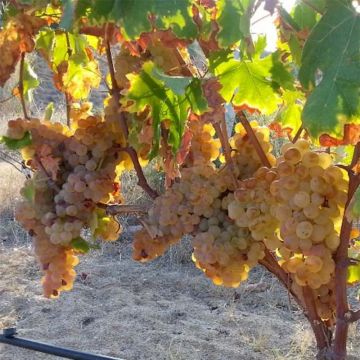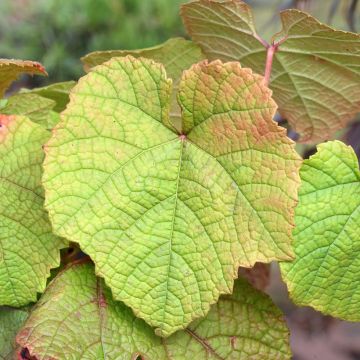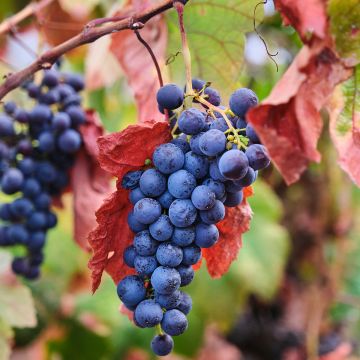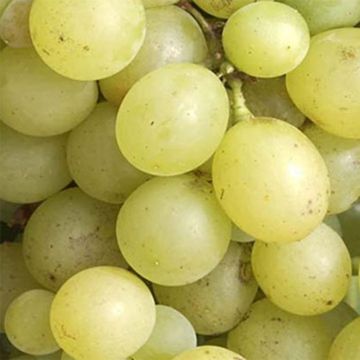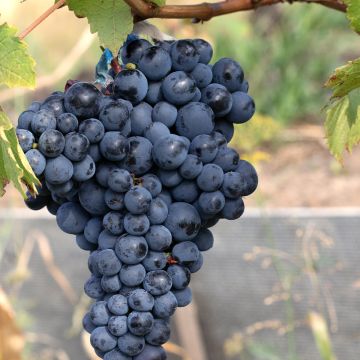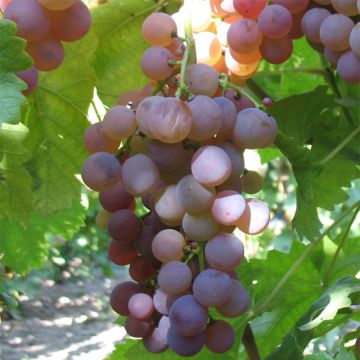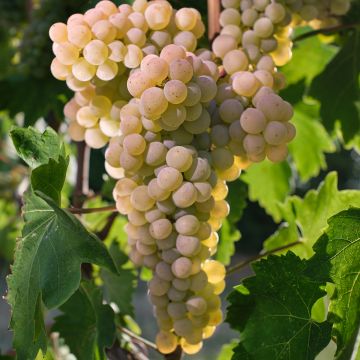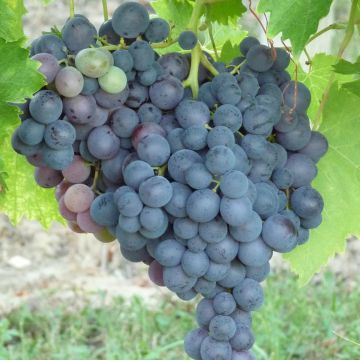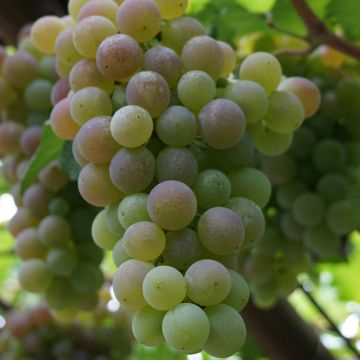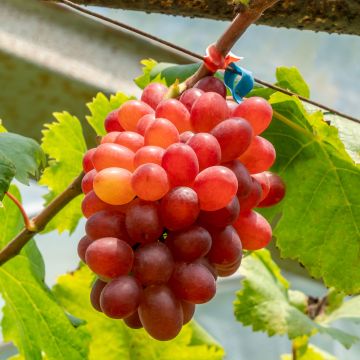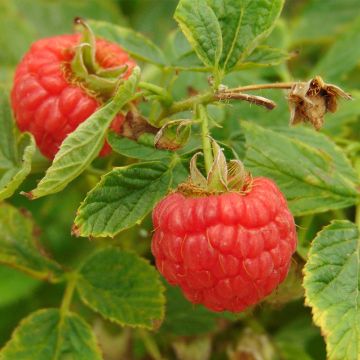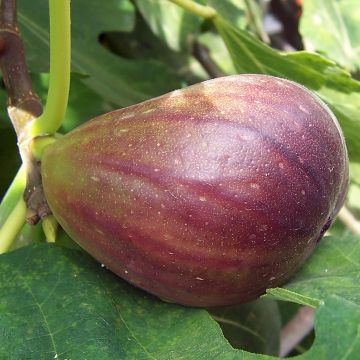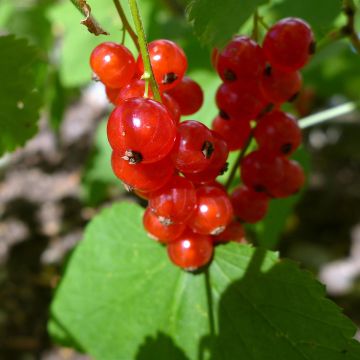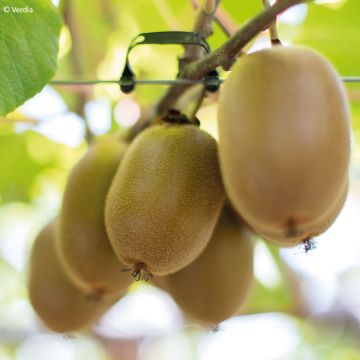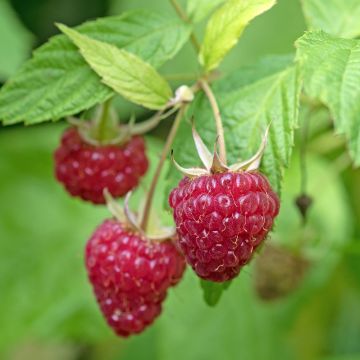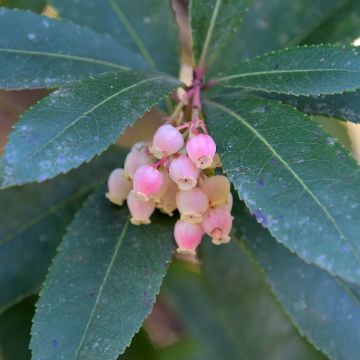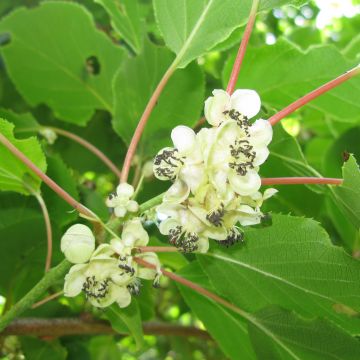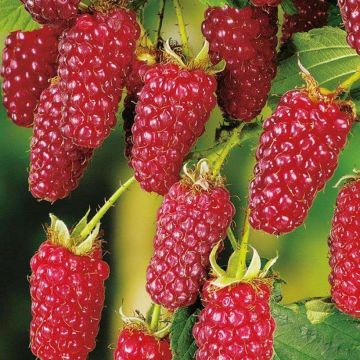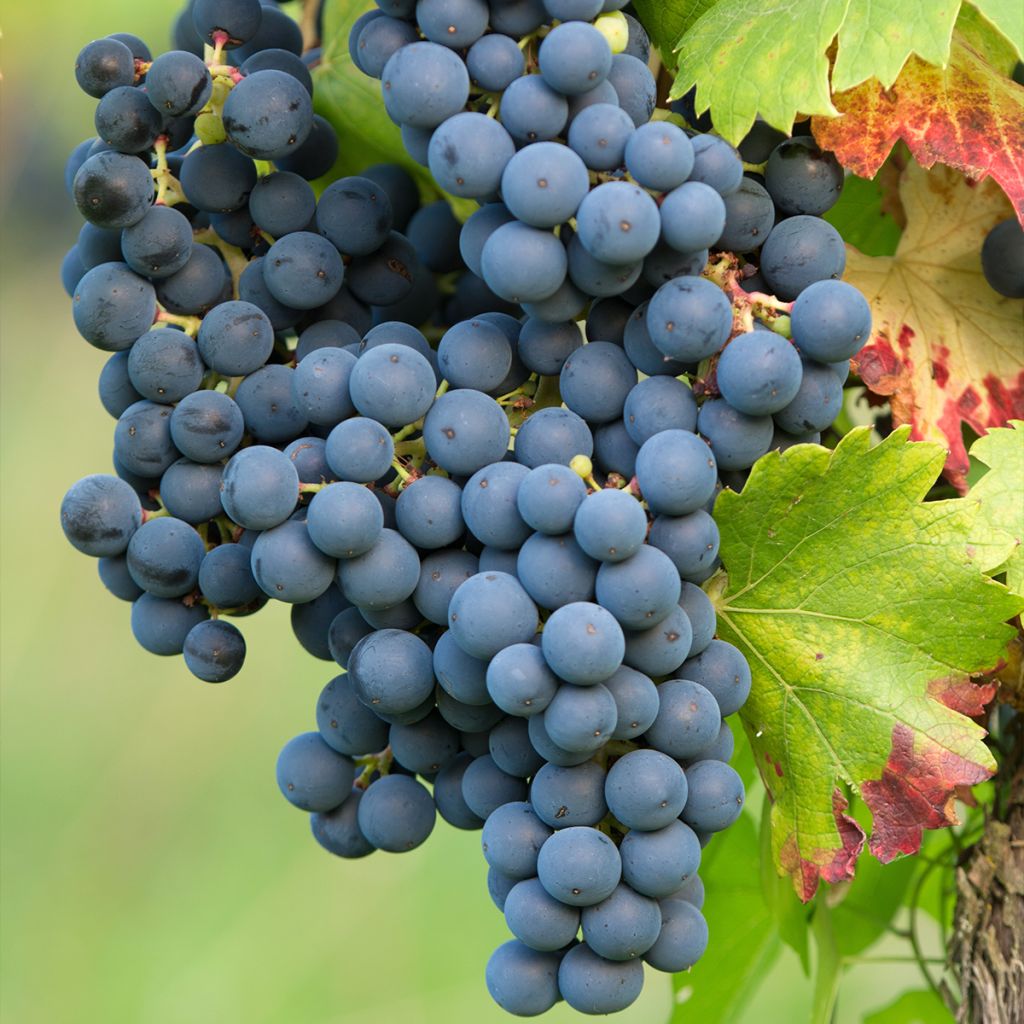

Vitis vinifera Regent
Vitis vinifera Regent
Vitis vinifera Regent
Common Grape Vine, European Grape, Wine Grape
Special offer!
Receive a €20 voucher for any order over €90 (excluding delivery costs, credit notes, and plastic-free options)!
1- Add your favorite plants to your cart.
2- Once you have reached €90, confirm your order (you can even choose the delivery date!).
3- As soon as your order is shipped, you will receive an email containing your voucher code, valid for 3 months (90 days).
Your voucher is unique and can only be used once, for any order with a minimum value of €20, excluding delivery costs.
Can be combined with other current offers, non-divisible and non-refundable.
Home or relay delivery (depending on size and destination)
Schedule delivery date,
and select date in basket
This plant carries a 6 months recovery warranty
More information
We guarantee the quality of our plants for a full growing cycle, and will replace at our expense any plant that fails to recover under normal climatic and planting conditions.
Description
The 'Regent' grapevine is a vigorous variety, resistant to diseases and winter cold, used for wine production, juices or to enjoy as table grapes, refreshing and sweet. It produces medium-sized, compact clusters. The medium-sized, tight, dark red grapes evolve into a bluish-black colour at ripeness, in September or October depending on the climate. The flesh is juicy. The organoleptic qualities of 'Regent' make it a popular grape variety in Europe, especially in Germany and Belgium, where it has joined traditional grape varieties and is used in high-quality blends under controlled designation of origin. The resulting wine is dry and light, with an intense light red colour, as this grape variety is pigmented. It is also cultivated in the severe climatic conditions of Northern Europe. In wet years, it is slightly less resistant to mildew. In autumn, its foliage turns beautiful shades of red to purple. Hardy and undemanding, it thrives in the sun, in ordinary but well-drained soil, preferably neutral to limestone.
The wine grape (Vitis vinifera) grew wild more than 5000 years ago, it belongs to the vitaceae family. Its introduction to France for cultivation was done by the Romans. Numerous hybrids have been created to vary colours, flavours, and uses. The 'Regent' vine is a German variety, obtained in 1967 by Ghernardt Alleweldt through the cross-breeding of the Diana and Chambourcin varieties. A vigorous sarmentous bush, the 'Regent' vine can reach up to 4m (13ft) in height. Its final shape will depend on the pruning practised. The vine can cling to its support (trellis, espalier...) thanks to its tendrils and thrives in sunny locations. It has a strongly upright habit. It is recommended to train it on wire and support it well. It is indifferent to soil types, not very demanding, but it prefers deep, nutrient-rich, and permeable soil. It will require careful pruning.
Its foliage is slightly lobed, with a deep green colour in summer, turning red and purple in autumn. Its cluster flowering occurs in May, offering small white-pink flowers. Its grapes ripen in medium-sized clusters between September and October, depending on the regions and the climate. The small, richly coloured berries are spherical, with thick skin, turning blue-black at maturity. The flesh is meltingly soft when ripe.
Not very sensitive to diseases, this vine avoids repeated treatments. It is indifferent to soil types: not very demanding, although it prefers clay-limestone and stony soils. 'Regent' can climb on any available support: it covers fences, climbs over hedges, reaches into shrubs and trees, and quickly adorns pergolas and arbors. It is advisable to trellis it against a well-exposed stone wall so that it can benefit from maximum sunlight.
The grapes can be consumed as table fruit, fresh, but also in jams, jellies, fruit juice, pastries, and of course, after vinification, as wine. In general, grapes are rich in vitamin B, a source of fibre and manganese, and they are well-endowed with antioxidants. They are also believed to play a role in preventing cardiovascular diseases, and most importantly, they are a healthy, natural, and tasty dessert. To enjoy different flavours, plant a white grape variety like 'Fragola Bianca' alongside it, with its exceptional aroma. Or the 'Navaho' Thornless Blackberry, whose fruits you can enjoy fresh or cooked in desserts or jellies.
Report an error about the product description
Vitis vinifera Regent in pictures
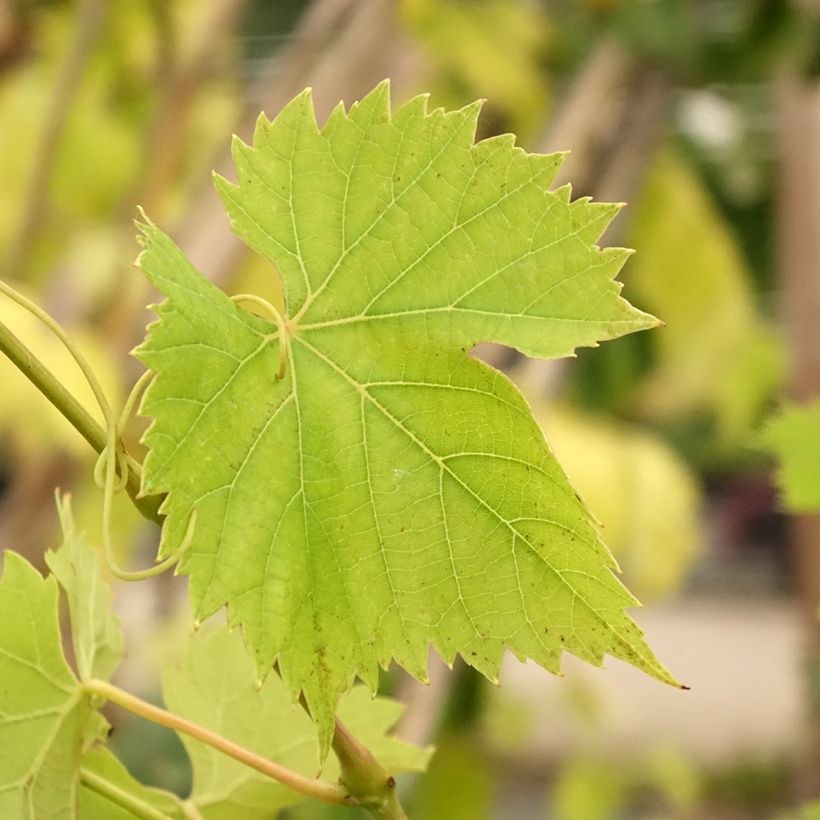

Plant habit
Fruit
Flowering
Foliage
Botanical data
Vitis
vinifera
Regent
Vitaceae
Common Grape Vine, European Grape, Wine Grape
Cultivar or hybrid
Other Grapevines
View all →Planting and care
Since the ravages of phylloxera in the late 19th century, the vine is obligatorily grafted onto different rootstocks, resistant to this disease, and adapted to different types of soil. These rootstocks come from American varieties. Plant the 'Regent' vine in autumn, in a deep, well-drained soil, even stony, arid, poor and chalky, in a well-exposed site, sheltered from strong winds. Incorporate into the planting soil 3 or 4 handfuls of fertiliser for fruit trees and 2 kg of composted manure for each plant. The roots should not come into contact with the manure. After planting, prune above 2 large buds in order to obtain the growth of two branches. Keep the most vigorous one and tie it to a stake. The training pruning will follow.
The vine does not require regular fertiliser application for good yield, on the contrary. Enrich the soil with potash slag, crushed horn or iron chelate, only every 2-3 years.
Planting period
Intended location
Care
This item has not been reviewed yet - be the first to leave a review about it.
Similar products
Haven't found what you were looking for?
Hardiness is the lowest winter temperature a plant can endure without suffering serious damage or even dying. However, hardiness is affected by location (a sheltered area, such as a patio), protection (winter cover) and soil type (hardiness is improved by well-drained soil).

Photo Sharing Terms & Conditions
In order to encourage gardeners to interact and share their experiences, Promesse de fleurs offers various media enabling content to be uploaded onto its Site - in particular via the ‘Photo sharing’ module.
The User agrees to refrain from:
- Posting any content that is illegal, prejudicial, insulting, racist, inciteful to hatred, revisionist, contrary to public decency, that infringes on privacy or on the privacy rights of third parties, in particular the publicity rights of persons and goods, intellectual property rights, or the right to privacy.
- Submitting content on behalf of a third party;
- Impersonate the identity of a third party and/or publish any personal information about a third party;
In general, the User undertakes to refrain from any unethical behaviour.
All Content (in particular text, comments, files, images, photos, videos, creative works, etc.), which may be subject to property or intellectual property rights, image or other private rights, shall remain the property of the User, subject to the limited rights granted by the terms of the licence granted by Promesse de fleurs as stated below. Users are at liberty to publish or not to publish such Content on the Site, notably via the ‘Photo Sharing’ facility, and accept that this Content shall be made public and freely accessible, notably on the Internet.
Users further acknowledge, undertake to have ,and guarantee that they hold all necessary rights and permissions to publish such material on the Site, in particular with regard to the legislation in force pertaining to any privacy, property, intellectual property, image, or contractual rights, or rights of any other nature. By publishing such Content on the Site, Users acknowledge accepting full liability as publishers of the Content within the meaning of the law, and grant Promesse de fleurs, free of charge, an inclusive, worldwide licence for the said Content for the entire duration of its publication, including all reproduction, representation, up/downloading, displaying, performing, transmission, and storage rights.
Users also grant permission for their name to be linked to the Content and accept that this link may not always be made available.
By engaging in posting material, Users consent to their Content becoming automatically accessible on the Internet, in particular on other sites and/or blogs and/or web pages of the Promesse de fleurs site, including in particular social pages and the Promesse de fleurs catalogue.
Users may secure the removal of entrusted content free of charge by issuing a simple request via our contact form.
The flowering period indicated on our website applies to countries and regions located in USDA zone 8 (France, the United Kingdom, Ireland, the Netherlands, etc.)
It will vary according to where you live:
- In zones 9 to 10 (Italy, Spain, Greece, etc.), flowering will occur about 2 to 4 weeks earlier.
- In zones 6 to 7 (Germany, Poland, Slovenia, and lower mountainous regions), flowering will be delayed by 2 to 3 weeks.
- In zone 5 (Central Europe, Scandinavia), blooming will be delayed by 3 to 5 weeks.
In temperate climates, pruning of spring-flowering shrubs (forsythia, spireas, etc.) should be done just after flowering.
Pruning of summer-flowering shrubs (Indian Lilac, Perovskia, etc.) can be done in winter or spring.
In cold regions as well as with frost-sensitive plants, avoid pruning too early when severe frosts may still occur.
The planting period indicated on our website applies to countries and regions located in USDA zone 8 (France, United Kingdom, Ireland, Netherlands).
It will vary according to where you live:
- In Mediterranean zones (Marseille, Madrid, Milan, etc.), autumn and winter are the best planting periods.
- In continental zones (Strasbourg, Munich, Vienna, etc.), delay planting by 2 to 3 weeks in spring and bring it forward by 2 to 4 weeks in autumn.
- In mountainous regions (the Alps, Pyrenees, Carpathians, etc.), it is best to plant in late spring (May-June) or late summer (August-September).
The harvesting period indicated on our website applies to countries and regions in USDA zone 8 (France, England, Ireland, the Netherlands).
In colder areas (Scandinavia, Poland, Austria...) fruit and vegetable harvests are likely to be delayed by 3-4 weeks.
In warmer areas (Italy, Spain, Greece, etc.), harvesting will probably take place earlier, depending on weather conditions.
The sowing periods indicated on our website apply to countries and regions within USDA Zone 8 (France, UK, Ireland, Netherlands).
In colder areas (Scandinavia, Poland, Austria...), delay any outdoor sowing by 3-4 weeks, or sow under glass.
In warmer climes (Italy, Spain, Greece, etc.), bring outdoor sowing forward by a few weeks.






























